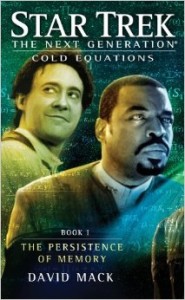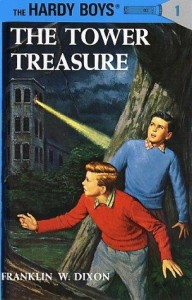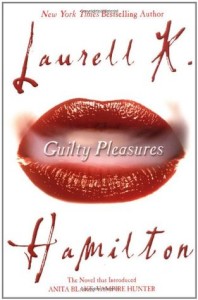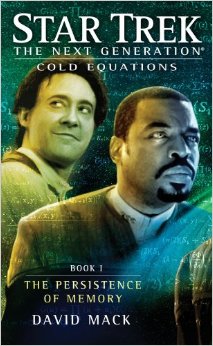This week’s Flashback Friday: Franchise Novels.
I’m happy to have author April Daniels here for a guest post on how franchise novels influenced her as a writer and taught her to never be ashamed of her interests and passions!
So, I guess I’ve got to open up about my dirty little secret.
Deep breath.
Here we go.
 The books I most clearly remember reading as a child were Star Trek: The Next Generation tie-in novels. I read some DS9 and Voyager books when they were available as well, but ST:TNG tie-in novels were the major staple of my reading as a young child.
The books I most clearly remember reading as a child were Star Trek: The Next Generation tie-in novels. I read some DS9 and Voyager books when they were available as well, but ST:TNG tie-in novels were the major staple of my reading as a young child.
There were some attempts to get me to read “classic” sci-fi since I was so heavily into Star Trek. (I wore my TNG uniform to school on more than one occasion, because I was an incredible badass who could not be contained.) I spit them out almost immediately. I just did not, could not, would not read and enjoy all the novels that the nerdy adults in my life thought I was supposed to be really excited about.
And fantasy? I never touched the stuff when I was little.
For strange reasons having to do with the very peculiar pocket of American Nerddom that I came up in, it wasn’t until high school that I learned that fantasy books came in formats other than the one-and-done novel. This means I didn’t read them, because I disliked almost any self-contained narrative with no larger series to hook into, a status quo to move back to. This prejudice was confirmed early when I discovered that I liked The Lion, The Witch, And The Wardrobe, but hated the sequels. All the characters in Prince Caspian were different. It was like starting over from scratch every time, and that, I assured myself, was bullshit. If I’d heard of Dragonlance while I was a kid, I’d have probably gobbled them up.
 In contrast, I was totally down with the Hardy Boys, particularly the modern re-launch that started around the early 90s, though I’d struggle to tell you the names of any of the characters in that series now. (It was a strangely violent series, I do remember that. One of the eponymous Boys sees his girlfriend get fridged by a car bomb in chapter two of the second book of the series, which went on to run like forty more volumes, each one featuring fistfights, gun battles, etc. It might be the first example of a darker and edgier reboot of a beloved series from yesteryear.) It was nice because every book was the same but different, and that’s really all I wanted.
In contrast, I was totally down with the Hardy Boys, particularly the modern re-launch that started around the early 90s, though I’d struggle to tell you the names of any of the characters in that series now. (It was a strangely violent series, I do remember that. One of the eponymous Boys sees his girlfriend get fridged by a car bomb in chapter two of the second book of the series, which went on to run like forty more volumes, each one featuring fistfights, gun battles, etc. It might be the first example of a darker and edgier reboot of a beloved series from yesteryear.) It was nice because every book was the same but different, and that’s really all I wanted.
I also remember reading a lot of Laura Ingalls Wilder’s Little House series, curled up in a tree next to my own home (which would later be tragically ripped away from us by machinations beyond my understanding; foreshadowing! Yay!). Again, same cast of characters, but a different story each time. (Well, with the exception of Farmer Boy, but that one I was okay with because my awesome grade school teacher read it to us, a chapter a week, and with her holding my hand I was willing to brave the howling wastelands of a narrative in which I didn’t already know who everyone was.)
As I started approaching middle school, I broadened my sci-fi horizons—now I was willing to read Star Wars books, too! I also read Battletech books, and other books put out by FASA‘s fiction publishing arm. (There were only like three Crimson Skies books ever published, and two of them really sucked. Oh man did I feel ripped off when the game line crashed.)
By the time I was in high school, I’d also found the guts to start reading fantasy, even in the absence of any readily identifiable cross-media franchise to glom onto.
 Guilty Pleasures, by Laurel K. Hamilton is the first fantasy book I ever read. I read it in large part because the blurb on the back sounded cool, but in hindsight, I think the comforting “Anita Blake: Vampire Hunter #1” label on the cover and the attendant promise that if I liked this I could stick with it for a good long while, also played a role. (And now, as an adult, I too write dark fantasy porn. Hooray for setups and payoffs!)
Guilty Pleasures, by Laurel K. Hamilton is the first fantasy book I ever read. I read it in large part because the blurb on the back sounded cool, but in hindsight, I think the comforting “Anita Blake: Vampire Hunter #1” label on the cover and the attendant promise that if I liked this I could stick with it for a good long while, also played a role. (And now, as an adult, I too write dark fantasy porn. Hooray for setups and payoffs!)
By the time I was in college, I was willing to read one-off novels. These days I’m more willing than ever to try something new. Hell, I read Dune, loved it, and deliberately stopped before the sequels because I heard they were a letdown. But it’s not something that comes naturally. It’s a tolerance that had to be built up, and has to be carefully tended to even today. I don’t think this makes me a bad reader with bad habits. I don’t think this makes me a lazy writer with bad habits.
Because, look, when you’re a young kid on the autistic spectrum, and you have trouble—real trouble, trouble you can tell the other kids don’t have, even if you can’t quite articulate the discrepancy—with remembering people’s names, the very last fucking thing you want to do in your pleasure reading is be trying to figure out who is who all over again every time you crack a book. That shit’s exhausting.
The other way my autism expressed itself was that I was a very literal-minded child, and the majority of these books were courteously written to be 100% subtext and symbolism free. I was about a billion times more interested in plot and character than anything going on beneath the layer of event-action-reaction. Subtext and symbolism were two more things I eventually picked up in college, at my own pace, when I was ready. I still don’t think they’re as important as a lot of other people say, and the difference between me and most of them is that when I sit down to write a story I can fucking finish it.
Anyhow, this is a long winded way of saying that anyone who tells you that you can’t grow up reading nakedly commercial fiction is full of shit and you shouldn’t listen to them. Anybody who implicitly suggests that you need to be able to rhapsodize on command about all the fond memories you have of reading the titans of the form and genre to have any credibility when talking about science fiction and fantasy is also full of shit and you shouldn’t listen to them either. You don’t need to be ashamed of having “wasted” your childhood reading all the “wrong” things. You don’t need to be ashamed of reading the “wrong” things now.
Read what you like. Don’t feel like there’s a canon you have to be conversant with. You really, really don’t.
Click here to read other Flashback Friday posts by other authors including Jean Walker, GG Silverman, Django Wexler, and more.


